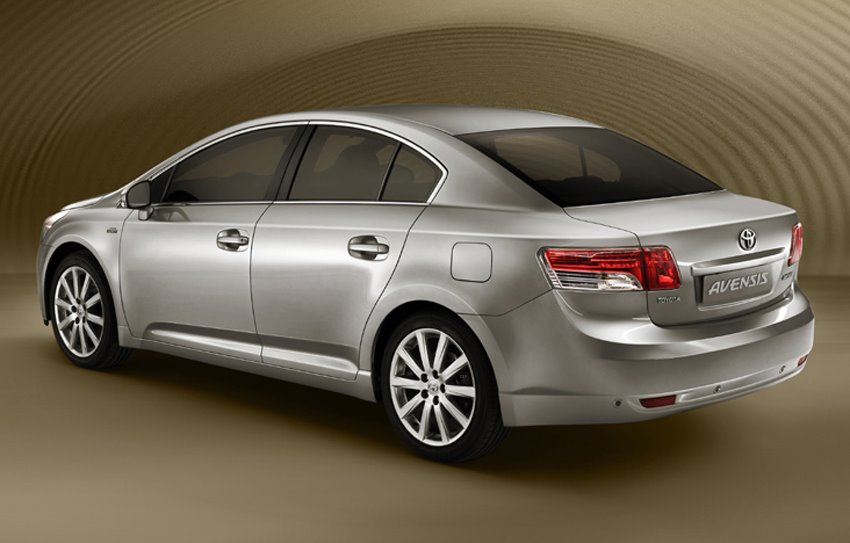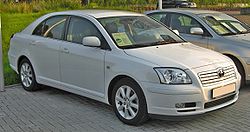The Toyota Avensis was introduced in 1997, to create a more modern name when compared with the reliable, but dull Toyota Carina E/Toyota Corona. Like its predecessor the Avensis was reliable, and proved a sales success for Toyota Europe. Over the years, the Toyota Avensis has advanced in size, technology, power, and economy to challenge its worldwide-known rivals, like the Mazda6, Ford Mondeo, Volkswagen Passat, Opel/Vauxhall Insignia, Citroën C5 and Peugeot 508.





First generation (1997–2003)
Toyota introduced the Avensis nameplate on its new model, which was launched at the end of 1997. Although an extensive revamp of the previous generation Carina E, the only main common parts were the engines, with an all new style of body. The car was built at the Burnaston factory in Derby. At the same time, production of the five-door Toyota Corolla also started at the British plant. The original Avensis had the option of four engines (1.6, 1.8 and 2.0-litre petrol and a 2.0-litre turbodiesel) and three body styles (saloon, hatchback and estate). The station wagon was essentially the Japanese-market second generation Toyota Caldina. All of the range gave solid build quality, excellent reliability, a spacious comfortable interior, generous equipment, smooth ride quality and good refinement, but very little in the way of excitement. A facelift in mid 2000 (which saw the engines fitted with variable valve timing) made little difference to this, although a sporty Avensis 2.0 L SR with bodykit and tuned suspension did become available. Engines
Avensis VersoThe Avensis Verso large MPV was introduced in 2001, with room for seven occupants and 2.0-litre engines only. The Verso's platform previewed the Avensis second generation. The Avensis Verso won Australia's Best People Mover, where it is simply called Avensis, the other variants unavailable to that market.
Second generation (2003–2008)
The second generation Toyota Avensis (model code T250) was launched in early 2003 in an all-new format; this time it offered more in the way of driver involvement and visual appeal. Like the Toyota Echo and Toyota Corolla, it was penned by the company's design studio in France.[3] The 1.6, 1.8 and 2.0-litre petrol and 2.0-litre turbodiesel engines were carried over from the previous Avensis, and the 2.4-litre four-cylinder from the Camry was also added to the range. This was the first Avensis to be exported to Japan. Due to the Camry Wagon ending production, the Avensis Wagon is exported to New Zealand, in both 1.8 and 2.0-litre forms. In Britain, there were no 1.6 versions available. In the 2004 European Car of the Year contest, the Avensis was just edged out by the top three, Fiat Panda (Winner), Mazda3 (2nd Place) and the Volkswagen Golf (3rd Place). However it won the 2004 Semperit Irish Car of the Year. What Car? awarded the Avensis as the "Best Family Car" for 2004 and 2005. Following the withdrawal of the Toyota Camry in 2004 (2005 in Switzerland), the Avensis became the largest Toyota saloon sold in Europe. Trim levels in the UK are the T2, T3-S, T3-X, T4, T Spirit, T180 and the TR. There is also a special edition, based on the T2 called the Colour Collection. In Ireland there were five trim levels - Terra, Aura, Strata, Luna, and Sol. The original 115 PS (85 kW) D-4D Diesel engine has been complemented with a 2.2 L D-4D in 136 PS (2AD-FTV) and 177 PS (2AD-FHV) versions. Newer versions have dropped the "D-4D" and "2.0" badging from the front wings and tailgate respectively. In Japan, the Avensis is sold as 2.0 Xi, 2.0 Li, and 2.4 Qi. Only the base model 2.0 Xi is offered with 4-wheel drive. In 2003, the Avensis became the first Japanese vehicle to receive a This is first and only one generation of Avensis sold in Egypt and Morocco, not in Persian Gulf countries. The Avensis Verso continued to be available alongside the new Avensis until 2006. A replacement to take over from the Avensis Verso, Toyota Previa and Toyota Sienna has yet to be unveiled, but is rumoured to feature Toyota's 2.2-litre D-4D engine. The new facelifted Toyota Avensis became available in June 2006. Some changes from the old model are the inclusion of turn signals in the side mirrors, an MP3/WMA/ASL-ready audio system, new front bumper, and a new grille. Interior materials and cloth seats have also been changed for 2006. Its multi display with on-board computer will be integrated in optitron display and is navigation ready. Also added are automatic headlights and a height-adjustable front passenger seat. The most notable mechanical difference is the addition of a 124 bhp (92 kW) D-4D engine. This, coupled to a six-speed manual gearbox, has lowered fuel consumption, emissions, and gives a quoted 0-60 mph time of 10.5 seconds. Engines
Third generation (2008–present)
The third generation Toyota Avensis (model code T270) was revealed at the 2008 Paris Motor Show, before going on sale in January 2009. Like the previous model it is built at Toyota's Burnaston plant in Derbyshire, England. Toyota ED2 initially designed the Avensis giving it a more sleek and athletic stance. Coefficient of Drag (Cd) figures are 0.28 for the sedan and 0.29 for the wagon body. Other design goals were to create the most comfortable suspension in its class while still offering sporty handling. The Avensis continues to use front McPherson struts and rear double wishbones. Unlike previous Avensis models, there is no five-door hatchback in this line-up. Major options include bi-xenon HID headlamps, Adaptive Front-lighting System (AFS), and adaptive cruise control. For safety, seven airbags are standard, including two front row side torso airbags, two side curtain airbags for both rows, and a driver’s knee airbag. For rear collisions, active front headrests designed to help reduce whiplash are standard as well as brake lights that flash under emergency braking. Vehicle Stability Control+ (VSC+) applies torque to the steering wheel to aid the driver in steering. A Pre-Collision System (PCS) becomes optional which includes Lane Departure Warning (LDW) and Lane Keeping Assist (LKA). The Avensis received a five star rating ( EnginesThe Avensis offers three petrol and three diesel engine options. The new engines feature more power and lower CO2 emissions. The new ZR engines became the first to introduce Toyota's Valvematic technology. (Correction needed)
All engines are mated to a 6-speed manual transmission while the 1.8 L and 2.0 L petrol engines are available with a Multidrive S CVT transmission. The 2.2 litre D-4D 150 hp engine is available with a 6-speed automatic transmission. MotorsportsOn 2 August 2010 it was announced the British Touring Car Championship's NGTC prototype car will be built around the Toyota Avensis. Series organiser TOCA, which will fully introduce the new low-cost NGTC technical regulations in 2011, said that the Japanese manufacturer would supply a donor car and a new body shell to the programme. | |||||||||||||||||||||||||||



No comments:
Post a Comment